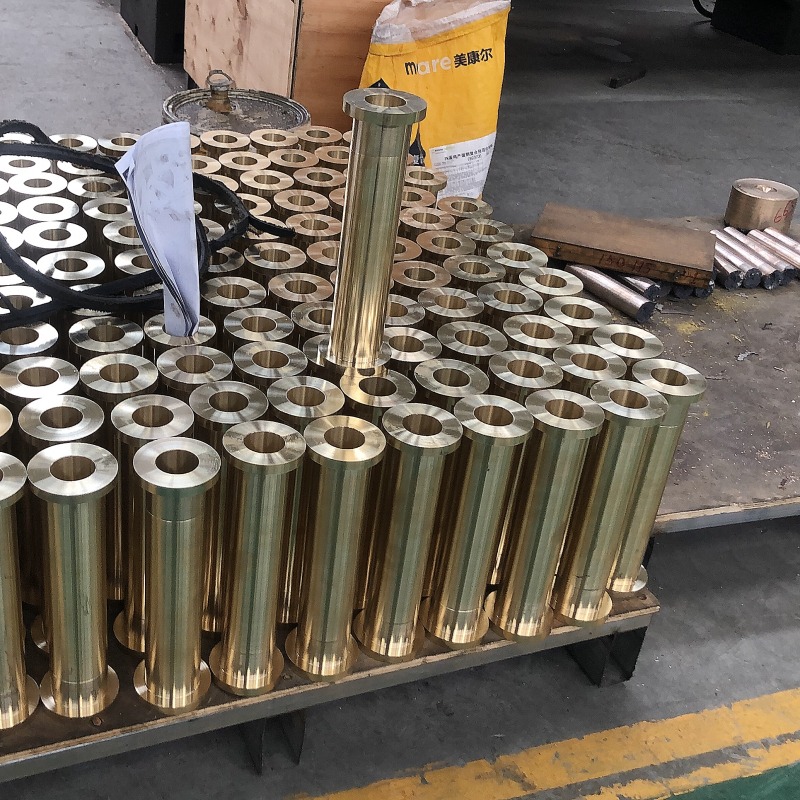
Home > News > Industry news > What is the difference between bronze bushings and brass bushings?
Bronze bushings and brass bushings are two common copper alloy products, the main difference lies in their alloy composition, performance and application.
Main components: copper and tin-based, usually containing a small amount of other elements, such as lead, phosphorus, zinc and so on.
Types of bronze: According to the different elements added, bronze can be divided into tin bronze, aluminium bronze, phosphorus bronze and so on. The main feature of bronze is the addition of tin or other elements, which has better corrosion resistance and wear resistance.
Strong wear resistance: bronze bushings are especially suitable for high load, low speed friction conditions because of its good wear resistance.
Good corrosion resistance: bronze has good corrosion resistance to atmosphere, fresh water, seawater and other environments, especially suitable for marine environment.
High fatigue resistance and strength: bronze has high fatigue resistance and strength, suitable for use in high load environment.
Application: As bronze bushings have good wear resistance and corrosion resistance, it is usually used in heavy machinery, bearings, gears, pumps, valves, etc. working under high load and high temperature environment. It is also commonly used in marine engineering equipment such as ship fittings and diving equipment due to its excellent resistance to seawater corrosion.
Colour: It is dark in colour, usually appearing brown, brown or with a hint of red, and will gradually darken with oxidation.
Electrical and thermal conductivity: bronze bushings have relatively poor electrical and thermal conductivity, suitable for occasions that require wear and corrosion resistance rather than high electrical or thermal conductivity.

Main components: copper and zinc-based, brass containing zinc is usually between 5% and 40%, and sometimes add a small amount of aluminium, iron, manganese and other elements to improve performance.
Brass types: ordinary brass (copper-zinc alloy) and special brass (adding other elements of copper-zinc alloy, such as aluminium brass, lead brass).
Good ductility: brass has excellent plasticity and ductility, suitable for machining, moulding and casting, especially excellent in low and medium loads.
Moderate strength: brass bushings have moderate tensile strength and hardness, suitable for general mechanical parts, but not as good as bronze bushings under high loads.
Better corrosion resistance: Brass has good corrosion resistance, especially in dry air, but is not as corrosion resistant as bronze in acidic or alkaline environments.
Application: Brass bushings are mainly used in applications requiring ductility and workability, and are widely used in plumbing fittings, electrical connectors, low-friction mechanical parts and decorative parts. Due to its good workability, brass is usually used in low and medium load bushings, guide bushings, couplings, fasteners and so on.
Colour: The colour is bright yellow or golden yellow, with a brighter and more decorative appearance.
Electrical and thermal conductivity: brass bushings electrical conductivity and thermal conductivity is better than bronze, suitable for applications that require better electrical conductivity or thermal conductivity, such as electrical terminals or heat sinks.

Bronze bushings are more suitable for heavy-duty, wear-resistant, corrosion-resistant working conditions, and are widely used in industrial equipment, high-load machinery, and marine environments.
Brass bushings, on the other hand, are mainly characterised by good ductility and processability, and are suitable for low and medium load mechanical parts and electrical and decorative parts.
+86 17719955658
AddMazhuang Village, Yuhe Town, Huixian City, Xinxiang City, Henan Province, China
E-maildora@hsjxchina.com
Copyright @ 2024 Haishan Bronze Casting No:84463
Copyright @ 2024 Haishan Bronze Casting
Copyright @ 2024 Haishan Bronze Casting